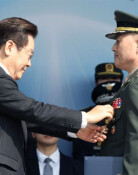[Editorial] Absurd Budget Planning
[Editorial] Absurd Budget Planning
Posted December. 11, 2006 06:58,
The government plans to increase the budget for readdressing the past to 395 billion won ($420 million), up 82 percent compared to that of this year. Next years budget for compensating and supporting victims of past authoritarian governments and Japanese colonial rule will reach 333.1 billion won. In addition, nine government-sponsored committees have dramatically increased their budgets for overseas research activities and promotion. It seems obvious that the government is trying to use historic legacy issues for political purposes in the next years presidential elections.
The incumbent administration has launched 14 history related committees over the past four years, and has poured some 216.8 billion won of taxpayer money into them just in 2006. This is a typical case of wasting national resources and taxpayer money. Several of the committees have often conducted researches on same historical incidents. Although a great portion of the budget goes to the pockets of committee members as their paychecks, they have not even accomplished any major break-through in their investigation. However, the government, which should integrate or reduce the committees not to waste money, has proposed an amplified budget to the National Assembly.
The increased budget is mainly to finance pork-barrel projects such as compensation or memorial park projects. The Truth and Reconciliation Commission has also requested 600 million won for next years overseas research activities. It is, however, how to understand why so much overseas investigation is required for reviewing Koreas modern history. Are they just simply trying to use as much taxpayer money as possible by collaborating with the Roh administration that uses historic issues as their weapons?
While the 14 history-related committees are carelessly spending taxpayer money, the government is making virtually no effort for the future. There are only three government sponsored committees established to address emerging problems, including the Presidential Commission on Aging Society and Population Policy. The total budget of these future-related committees has been a meager 14.3 billion won over the past four years. This translates into an annual budget of 3.6 billion won, less than one percent of the sum of the past-related committees budgets.
The governments persistent policies emphasizing on the past, instead of the future, have inflicted great suffering on ordinary citizens. Next years GDP growth is forecasted to be only about four percent and the youth unemployment rate has been staggering along at eight percent, the highest since 1999. In addition, household debts have surged to 558 trillion won, increasing the financial burden on the people.
Because its better late than never, the government must pledge to do its best for a better and more promising future for its people. However, it is still planning to focus on past-related efforts next year. This is ridiculous.




![지하철 타고 가는 북한산성…외국인도 반한 ‘K등산 맛집’[전승훈 기자의 아트로드]](https://dimg.donga.com/c/138/175/90/1/wps/NEWS/IMAGE/2026/01/10/133120824.1.jpg)


